|
|
|
Sort Order |
|
|
|
Items / Page
|
|
|
|
|
|
|
| Srl | Item |
| 1 |
ID:
186491
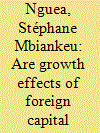

|
|
|
|
|
| Summary/Abstract |
Sub-Saharan Africa's electrification rate of 45% in 2018 remains extremely low compared with other developing regions. This study investigates if foreign capital could significantly contribute to enhancing the electricity access rate in Africa, a subject so far neglected in the literature. Specifically, it seeks to know whether increasing FDI, remittances and foreign aid matter for access to electricity in Africa. We utilize a dynamic panel System-Generalized Method of Moments (Sys-GMM) estimator to analyse data collected on a panel of 36 African countries over 2000–2017. The empirical findings show that FDI and remittances are positively and significantly related to increasing access to electricity. Moreover, our results show that foreign aid reduces the electricity access. We finally find that remittances reduce urban-rural disparities in access to electricity, while FDI and foreign aid increase disparities. These results remain consistent when we perform sub-regional analyses, suggesting that African countries should rely more on remittances and FDI to promote universal access to electricity.
|
|
|
|
|
|
|
|
|
|
|
|
|
|
|
|
| 2 |
ID:
131014
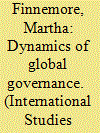

|
|
|
|
|
| Publication |
2014.
|
| Summary/Abstract |
It is hard to quarrel with Weiss and Wilkinson's argument that deeper investigation of global governance could have big payoffs, and the four "primary pursuits" or research tasks they sketch will interest many scholars in this field. My concern is that while Weiss and Wilkinson nicely describe the importance of these tasks, they offer only cursory suggestions about ways forward when they could do much more. Unlike Weiss and Wilkinson (hereafter W&W), I see a great deal of first rate work being done that speaks directly to issues they raise-how power is exercised globally,2 structures of global authority,3 increasing complexity,4 actor proliferation, and change. The problem, I would argue, is not that scholars are ignoring these issues, but that so much more could and should be done. In this short essay, I build on foundations laid by others to sketch more focused research agendas for global governance scholars in four areas to tackle some of the central questions W&W identify, with particular attention to their laudable interest in change.
|
|
|
|
|
|
|
|
|
|
|
|
|
|
|
|
| 3 |
ID:
084267
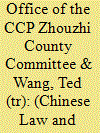

|
|
|
| 4 |
ID:
131012
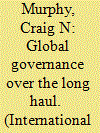

|
|
|
|
|
| Publication |
2014.
|
| Summary/Abstract |
WILKINSON and Weiss (W&W) suggest that questions surrounding global governance-"what makes the world hang together," to follow Ruggie (1998)-should become a central problematique for social scientists and historians studying the relations among the largest human communities in any era and therefore a central matter of interest for International Relations (IR). W&W argue that we should pursue this interest by (i) investigating the different forms of world organization across historical epochs; (ii) identifying and explaining both the largest structures of authority in any epoch as well as their interaction with more local systems; (iii) focusing our attention on power, interests, and on ideas-both those through which actors of a particular epoch come to understand their interests and those that reinforce, perhaps legitimately, the systems of authority of the day; and (iv) searching for ways to account for change both within and between epochs
|
|
|
|
|
|
|
|
|
|
|
|
|
|
|
|
| 5 |
ID:
180125


|
|
|
|
|
| Summary/Abstract |
The promotion of low-carbon home retrofit among UK homeowners is widely recognised as an important strategy to reduce operational energy use in dwellings and mitigate climate change. The related predominant UK policy approach is to address various market failures and develop the market for low-carbon retrofit and innovation. The current low uptake rate of low-carbon home retrofit suggests that a complementary policy approach is necessary to increase it and support households in their change towards low-carbon living. This paper uses an innovation framework to analyse retrofit as an innovation-decision process of several stages. Low-carbon technology is conceptualised at three nested levels: product, design option and technological system. A multiple-case study approach is used to analyse eight home retrofit cases from the SuperHomes network, that achieved significant carbon emission reductions through retrofit activities. Case analysis shows that: (i) homeowners collect information for each technology level through different communication channels, which are not interchangeable; (ii) homeowners develop a certain capacity to transform their environmental concerns into substantial retrofit activities; (iii) the positive retrofit experience of homeowners is crucial to develop such capacity and to convince others to retrofit their homes. These findings have important implications for energy policy on retrofit uptake in UK to support household transition to low-carbon living.
|
|
|
|
|
|
|
|
|
|
|
|
|
|
|
|
| 6 |
ID:
084523
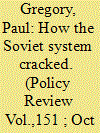

|
|
|
| 7 |
ID:
121788
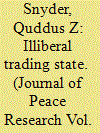

|
|
|
|
|
| Publication |
2013.
|
| Summary/Abstract |
Liberal systemic theory is built on the assumption that the system's dominant configuration is a Kantian confederation of major powers. In addition to being a democratic cluster, the liberal core is also a capitalist club. This article pushes systemic and socialization theory forward by introducing the mechanism of economic competition as an important driver of socialization. The article develops a theory of system-level competition, arguing that it is a distinct and co-equal mechanism of socialization to the established mechanisms of persuasion, inducement, and coercion. The article proposes a three-staged model of socialization that explains how prominent rising powers such as Turkey, India, Brazil, and China are being socialized into the liberal system. At the first phase, competitive pressure, outsiders are led to orient themselves toward the core out of a fear of falling behind and a desire to access network benefits. At the second phase, rushing, outsiders behave in pro-norm ways and make significant concessions in order to gain inclusion in the core's institutional complex. At the third phase, internalization, external norms become embedded in domestic legal institutional structures and a robust pro-norm domestic coalition emerges. The article uses the case of China to illustrate the model and lend it some initial empirical support in one hard case.
|
|
|
|
|
|
|
|
|
|
|
|
|
|
|
|
| 8 |
ID:
100139


|
|
|
| 9 |
ID:
114048
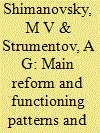

|
|
|
|
|
| Publication |
2012.
|
| Summary/Abstract |
The paper outlines the properties of the human mobilization resources accumulation system. It establishes which system classes it relates to, describes its functioning and development patterns, and also formulates the principles, which should underlie its reform.
|
|
|
|
|
|
|
|
|
|
|
|
|
|
|
|
| 10 |
ID:
165617
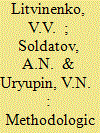

|
|
|
|
|
| Summary/Abstract |
his paper examines methodological features of weapons and military and specialized hardware items (WaMSH items) modernization from a systemic perspective, names the indices and objectives of modernization, reveals and formulates organizational, methodological, and procedural principles for WaMSH items modernization. The paper examines criteria, indices, and merits of models for evaluating system-forming and supporting properties of WaMSH items. It discusses methodological approaches to building prognostic models for modernizing WaMSH items.
|
|
|
|
|
|
|
|
|
|
|
|
|
|
|
|
| 11 |
ID:
098953
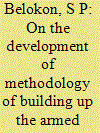

|
|
|
| 12 |
ID:
131013
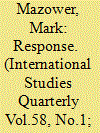

|
|
|
|
|
| Publication |
2014.
|
| Summary/Abstract |
Weiss and Wilkinson ask us to figure out how to give greater precision to the concept of "global governance" in order better to understand how the world is run and perhaps also to have greater hope of changing it in the way we would like. This approach assumes that the concept is worth sticking with. I find myself unsure of this.
On the one hand, as they point out, international affairs did acquire a greater degree of functional complexity toward the end of the twentieth century as a variety of nonstate actors took on global roles and states themselves became umbrella rubrics for ever proliferating agencies and ministries with international competences. There is no question that Realism in particular was poorly equipped to understand this 'new world order'.
|
|
|
|
|
|
|
|
|
|
|
|
|
|
|
|
| 13 |
ID:
143669
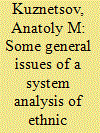

|
|
|
|
|
| Summary/Abstract |
The article claims that the two established traditions of discussion of ethnic issues, both the Russian Theory of ethnos and the Western concepts of ethnicity, were not able to offer convincing scholarship results. The major reason for the existence of the current state of affairs is related to the constraints imposed by the disciplinary (ethnographic and anthropologic) approaches toward the development of the ethnic theories. To eliminate the identified deficiencies, it is suggested to use the ideas of the system paradigm, which defines the ethnic group as a complex formation able to reproduce itself (autopoiesis) by means of self-reference that is based on self-observation. In this context, a high theoretical potential is demonstrated by the Theory of Ethnos of Sergei Shirokogoroff, who in the 1920s–1930s suggested to use an interdisciplinary approach toward understanding of the issue of an ethnic diversity of humankind. Synthesis of these disciplines was implemented on the basis of ideas, which preempted a number of provisions of a system paradigm, such as ethnos as a process, which involves ethnic groups, and Psychomental Complex it is important to add as a foundation for cultural adaptation and preservation of ethnic groups. These findings demonstrate a necessity to use Shirokogoroff’s theory to address the existing ethnic challenges with consideration of ethnic policies of different states.
|
|
|
|
|
|
|
|
|
|
|
|
|
|
|
|
| 14 |
ID:
072062
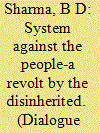

|
|
|
| 15 |
ID:
118341
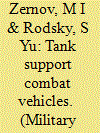

|
|
|
|
|
| Publication |
2012.
|
| Summary/Abstract |
The paper argues the need to introduce tank support combat vehicles (TSCV) in tank units. It shows not only their importance for reducing tank losses but also their role in solving other problems of combined-arms warfare, and offers a way of furthering the project.
|
|
|
|
|
|
|
|
|
|
|
|
|
|
|
|
| 16 |
ID:
133355
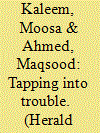

|
|
|
|
|
| Publication |
2014.
|
| Summary/Abstract |
Imagine a city that requires 1,000 million gallons of water every day and then imagine a system that, even in the best case scenario, can carry only half of that water to the city. It is inevitable that dishonest officials, unscrupulous elements, profiteers and even crime rackets see this shortage as a window of opportunity to make a quick buck. Quite naturally, those vested in its failure would like to keep the system as inadequate and inefficient as it always has been. This is Karachi and a summary of its water woes for you.
|
|
|
|
|
|
|
|
|
|
|
|
|
|
|
|
| 17 |
ID:
133356
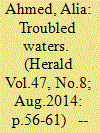

|
|
|
|
|
| Summary/Abstract |
One April day in 2013, six artists got together and envisioned Karachi as they would like to see it, in place of the crumbling, violent megacity at their doorstep. Months later, in November, the team brought to their city a three-day explosion of street art, theatre, discussions, documentary screenings, exhibitions and live music under the the Pursukoon Karachi Festival. For a lasting effect, the festival launched its ultimate undertaking - renovating the Karachi Cantonment Railway Station.
|
|
|
|
|
|
|
|
|
|
|
|
|
|
|
|
| 18 |
ID:
133357
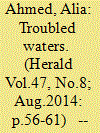

|
|
|
|
|
| Publication |
2014.
|
| Summary/Abstract |
One April day in 2013, six artists got together and envisioned Karachi as they would like to see it, in place of the crumbling, violent megacity at their doorstep. Months later, in November, the team brought to their city a three-day explosion of street art, theatre, discussions, documentary screenings, exhibitions and live music under the the Pursukoon Karachi Festival. For a lasting effect, the festival launched its ultimate undertaking - renovating the Karachi Cantonment Railway Station.
|
|
|
|
|
|
|
|
|
|
|
|
|
|
|
|
|
|
|
|
|